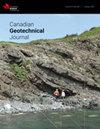不饱和状态下氯化钠结晶对道路基层骨料剪切特性的影响
IF 3.5
3区 工程技术
Q2 ENGINEERING, GEOLOGICAL
引用次数: 0
摘要
在沿海地区,氯化钠在路面结构中的沉淀和侵入是不可避免的,会影响道路基层的力学性能。为了研究这个问题,用氯化钠溶液的样品在恒温室中固化,直到它们达到规定的氯化钠在孔隙中沉淀的状态。计算机断层扫描(CT)发现了一个临界结晶度(ωc),对应于孔隙盐壳胶结土壤颗粒的开始形成。在不同的盐结晶状态下进行了一系列非饱和大尺度三轴剪切试验。结果表明:在结晶初期(ω<ωc),由于盐粉的包覆和润滑作用,峰值应力和内摩擦角随ω减小,而表观黏聚保持不变。当ω>ωc时,由于盐壳的吸附和胶结作用增强,路面基层骨料的峰值应力、内摩擦角和表观黏聚力均快速增长。考虑盐沉降的影响,提出了一种改进的抗剪强度准则,可用于预测盐化路面基层骨料的抗剪强度。本文章由计算机程序翻译,如有差异,请以英文原文为准。
Effects of Sodium Chloride Crystallization on Shear Characteristics of Road Base Aggregates under Unsaturated State
The precipitation and intrusion of sodium chloride into pavement structures is inevitable in coastal regions, which can affect the mechanical properties of the road base courses. To investigate this problem, samples with sodium chloride solution were cured in a thermostatic chamber until they reached the specified states of sodium chloride precipitation within the pores. A critical crystallization degree (ωc) was discovered by computerized tomography (CT) scan, corresponding to the start of formation of porous salt crust cementing the soil particles. A series of unsaturated large-scale triaxial shear tests was then conducted under various states of salt crystallization. The results showed that in the early stages of crystallization (i.e., ω<ωc), the peak stress and internal friction angle decreased with ω because of the coating and lubricating effects of salt powders, while the apparent cohesion remained constant. When ω>ωc, owing to the increasing adsorption and cementation effects of the salt crust, rapid growth was observed for the peak stress, internal friction angle, and apparent cohesion of the road base aggregates. Considering the influence of salt precipitation, a modified shear strength criterion that can predict the shear strength of the salinized road base aggregates was formulated.
求助全文
通过发布文献求助,成功后即可免费获取论文全文。
去求助
来源期刊

Canadian Geotechnical Journal
地学-地球科学综合
CiteScore
7.20
自引率
5.60%
发文量
163
审稿时长
7.5 months
期刊介绍:
The Canadian Geotechnical Journal features articles, notes, reviews, and discussions related to new developments in geotechnical and geoenvironmental engineering, and applied sciences. The topics of papers written by researchers and engineers/scientists active in industry include soil and rock mechanics, material properties and fundamental behaviour, site characterization, foundations, excavations, tunnels, dams and embankments, slopes, landslides, geological and rock engineering, ground improvement, hydrogeology and contaminant hydrogeology, geochemistry, waste management, geosynthetics, offshore engineering, ice, frozen ground and northern engineering, risk and reliability applications, and physical and numerical modelling.
Contributions that have practical relevance are preferred, including case records. Purely theoretical contributions are not generally published unless they are on a topic of special interest (like unsaturated soil mechanics or cold regions geotechnics) or they have direct practical value.
 求助内容:
求助内容: 应助结果提醒方式:
应助结果提醒方式:


